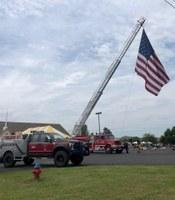Fire Prevention Tips

- Clean dryer vents frequently and empty lint screens after each load.
- Consider installing a carbon monoxide detector and/or propane detector to add extra safeguards against hazardous situations.
- Don't place hay, straw, or other combustible materials beneath your home as they can easily ignite.
- Faulty heating equipment plays a part in over 40% of winter home fires. You can help prevent fires by safely maintaining and operating your furnace, space heater, or wood stove. Have a qualified technician inspect your furnace, water heater, fuel lines, and gas pressure regulator every year.
- Keep baking soda near your stove to extinguish grease fires. If you don't have baking soda, use salt, but don't use water, which will spread the flame. Never leave cooking unattended.
- Never install a double-cylinder deadbolt lock on your exit doors. They require a key to unlock from the inside. When you need to exit in a hurry, this type of lock can be deadly.
- Replace any cord that is cracked or frayed. If an appliance smokes or has an unusual smell, unplug it and have it repaired by a professional.
- Install smoke detectors.
- Sometimes the sound of a smoke alarm doesn't wake small children. Test your alarms while your children sleep to ensure they are close enough to their bedrooms to wake them.
- Store all matches and lighters up high, preferably in a locked cabinet.
- Store flammable liquids like gasoline, kerosene, and paint thinner in approved containers outside your home, but not under your home. They produce invisible vapors that can ignite even from a small spark
- Water your Christmas tree daily and be sure it is placed away from exits and heat sources.
- Kids & Fire
- Home Fire Drills
